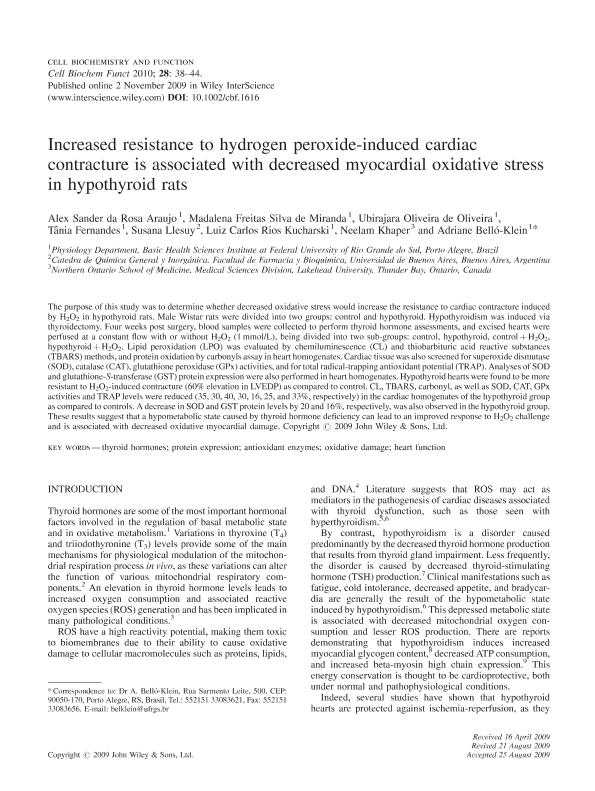Artículo
Increased resistance to hydrogen peroxide-induced cardiac contracture is associated with decreased myocardial oxidative stress in hypothyroid rats
Araujo, Alex Sander Da Rosa; Miranda, Madalena Freitas Silva de; Oliveira, Ubirajara de; Fernandes, Tânia; Llesuy, Susana Francisca ; Kucharski, Luiz Carlos Rios; Khaper, Neelam; Belló Klein, Adriane
; Kucharski, Luiz Carlos Rios; Khaper, Neelam; Belló Klein, Adriane
 ; Kucharski, Luiz Carlos Rios; Khaper, Neelam; Belló Klein, Adriane
; Kucharski, Luiz Carlos Rios; Khaper, Neelam; Belló Klein, Adriane
Fecha de publicación:
01/2010
Editorial:
John Wiley & Sons Ltd
Revista:
Cell Biochemistry And Function
ISSN:
0263-6484
Idioma:
Inglés
Tipo de recurso:
Artículo publicado
Clasificación temática:
Resumen
The purpose of this study was to determine whether decreased oxidative stress would increase the resistance to cardiac contracture induced by H 2O2 in hypothyroid rats. Male Wistar rats were divided into two groups: control and hypothyroid. Hypothyroidism was induced via thyroidectomy. Four weeks post surgery, blood samples were collected to perform thyroid hormone assessments, and excised hearts were perfused at a constant flow with or without H2O2 (1 mmol/L), being divided into two sub-groups: control, hypothyroid, control + H2O2, hypothyroid + H2O2. Lipid peroxidation (LPO) was evaluated by chemiluminescence (CL) and thiobarbituric acid reactive substances (TBARS) methods, and protein oxidation by carbonyls assay in heart homogenates. Cardiac tissue was also screened for superoxide dismutase (SOD), catalase (CAT), glutathione peroxidase (GPx) activities, and for total radical-trapping antioxidant potential (TRAP). Analyses of SOD and glutathione-S-transferase (GST) protein expression were also performed in heart homogenates. Hypothyroid hearts were found to be more resistant to H2O2-induced contracture (60% elevation in LVEDP) as compared to control. CL, TBARS, carbonyl, as well as SOD, CAT, GPx activities and TRAP levels were reduced (35, 30, 40, 30, 16, 25, and 33%, respectively) in the cardiac homogenates of the hypothyroid group as compared to controls. A decrease in SOD and GST protein levels by 20 and 16%, respectively, was also observed in the hypothyroid group. These results suggest that a hypometabolic state caused by thyroid hormone deficiency can lead to an improved response to H2O2 challenge and is associated with decreased oxidative myocardial damage.
Archivos asociados
Licencia
Identificadores
Colecciones
Articulos(IBIMOL)
Articulos de INSTITUTO DE BIOQUIMICA Y MEDICINA MOLECULAR
Articulos de INSTITUTO DE BIOQUIMICA Y MEDICINA MOLECULAR
Citación
Araujo, Alex Sander Da Rosa; Miranda, Madalena Freitas Silva de; Oliveira, Ubirajara de; Fernandes, Tânia; Llesuy, Susana Francisca; et al.; Increased resistance to hydrogen peroxide-induced cardiac contracture is associated with decreased myocardial oxidative stress in hypothyroid rats; John Wiley & Sons Ltd; Cell Biochemistry And Function; 28; 1; 1-2010; 38-44
Compartir
Altmétricas



